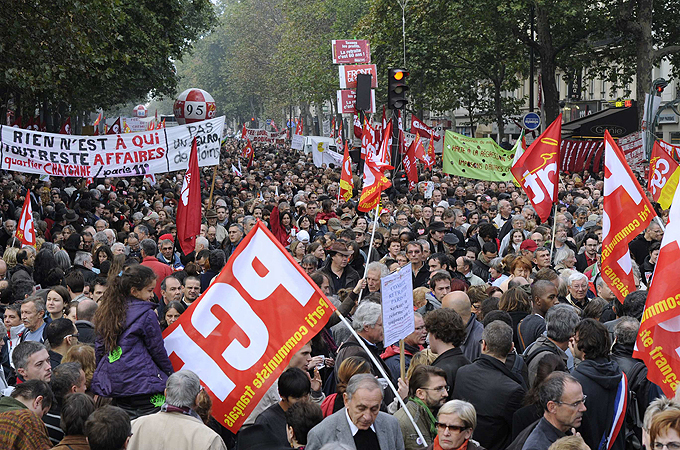Protests attack France pension plan
More than 2.5 million demonstrators take to the streets, unions say, as fears of a fuel shortage loom.

 |
| Protesters in Paris as part of a national day of mass rallies against pension reforms [REUTERS] |
The battle over a planned overhaul of France’s pension system has intensified, with hundreds of thousands of people taking part in the latest of a series of protests across the country.
Labour unions said that more than 2.5 million people joined the demonstrations on Saturday as strikes
at shut down oil refineries, sparking fears of a petrol shortage, and temporarily cut supplies to Paris’s airports.
Keep reading
list of 4 itemsBoeing hit with 32 whistleblower claims, as dead worker’s case reviewed
US imposes new sanctions on Iran after attack on Israel
A flash flood and a quiet sale highlight India’s Sikkim’s hydro problems
“Both sides seem to be really digging their heels in. [President] Sarkozy wants people to know he’s not giving into pressure from the street,” Al Jazeera’s Jacky Rowland, reporting from the French capital, said.
A broad alliance of unions, left-wing parties and students warned that another nationwide protest will be held on Tuesday in a final attempt to stop the legislation, which would raise the retirement age from 60 to 62 and see state pensions not awarded until aged 67, ahead of a government vote on Wednesday.
About 300,000 people had marched from Place de la Republique to Place de la Nation in Paris on Saturday, the labour unions said, but the government has claimed that the protests might be losing steam.
The government said it had counted 850,000 marchers at Saturday’s protest, down from 899,000 at a previous demonstration on October 2.
“I think the French people have understood that pension reform is essential and necessary,” Eric Woerth, the labour minister, told French television.
Fuel shortage fears
Since September 27, strikes against pension and port reforms at oil depots in the south of the country have left 63 oil, gas and chemical tankers waiting off the Mediterranean coast, Marseille port authorities said.
Strikes put pressure on petrol and diesel supplies across the country, notably when supplies to Paris’s regional and international airports were cut on Friday, but the pipelines running south from Le Havre were reportedly working again by late on Saturday.
Christine Lagarde, the economy minister, urged people not to panic over petrol supplies, as the country had ample stocks for now.
“We have reserves,” she told France’s RTL radio, adding supply problems had affected 230 petrol stations out of a total 13,000 in the country. “People mustn’t panic.”
Police were able to break up blockades at three fuel depots in southern France, easing some of the pressure at petrol stations, but that has not eased fears of a fuel shortage.
“People are panic buying. We’ve seen long lines of motorists queuing at filling stations,” Al Jazeera’s Harry Smith, reporting from Paris, said.
Lorry drivers are heavyweights in the realm of French protest movements and have announced their intention to join the protests.
Maxime Dumont, the head of the CFDT union’s lorry drivers’ section, said drivers could block fuel depots and food warehouses and clog roads by driving slowly.
Trash collectors in Marseille have also joined in the strikes, burning rubbish in the streets.
Unpopular presidency
The reforms remain likely to pass the Senate on Wednesday, but the protest movement has become the biggest challenge yet to the increasingly unpopular presidency of Nicolas Sarkozy.
The government says that raising the retirement age is the only way to save the money-draining pension system and that people have to work longer because they are living longer.
 |
| There are fears that Paris’ airports could run out of fuel as the blockade of fuel depots continues [EPA] |
Those opposed to the law say the government is rushing it through without enough consultation – an error that Dominique de Villepin was also accused of making in 2005, and which handicapped his term as France’s prime minister.
But many of the protestors, including the opposition Socialist Party, acknowledge the need for some kind of reform to the system.
“Retirement reform is necessary – we’re all agreed. To do it, we need to debate, to negotiate, and above all, fairness,” Martine Aubry, the Socialist leader said in an interview on France 2.
Other groups are more categorically opposed.
Olivier Besancenot, the charismatic leader of the New Anticapitalist Party (NPA) is back in the public limelight, after months of silence following his party’s disappointing results in the regional and EU elections.
In an interview with Le Monde, he declared that “a new May ’68 is possible,” referring to the nationwide protests and strikes that ended Charles De Gaulle’s presidency.
The president’s political capital is heavily invested in the reforms, and with neither sides likely to back down, the conflict could continue to undermine the government well after the vote.
Youth mobilisation
Of all the groups fighting against changes to the retirement age, young people arguably represent the biggest menace to the government.
Workers’ unions may have considerable political influence, but historically youth protest have contributed significantly toward bringing down government reforms.
More than 150 young people were detained across the country on Friday, according to the interior ministry. Both students and police have been injured, and the ministry has urged police to exercise restraint.
Juliane Charton, the treasurer for the UNL, a leading student union, said the government was choosing repression over dialogue with the student movement.
“The government’s response to this mobilisation is completely irresponsible,” she told Al Jazeera, referring to the outbreaks of violence between police and students.
Members of the governing UMP party have said that the young protesters are being manipulated, but Charton said the youth mobilisation was independent and “absolutely not” linked to any political party.
Charton said the planned reforms are of immediate concern for young people in France, since delaying retirement for the employed will increase the already high unemployment amongst the youth.
“This is a fight for the right to stable employment,” Charton said.